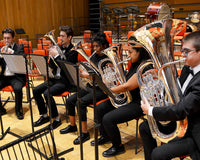The Benefits of Music Education in Schools have long been a subject of interest and debate for its role in children's development. Here we explore the myriad of benefits that music education offers, not just in the realm of the arts but also in a child's academic and psychological development.

Cognitive Advancements
Boosts Brain Development
Learning to play a musical instrument is akin to a workout for the brain. It engages multiple areas, including the prefrontal cortex, motor cortex and auditory cortex. This increased activity promotes cognitive development, enhancing skills like memory, attention and spatial-temporal abilities.
Enhances Academic Performance
Studies show that children who receive music lessons often perform better in subjects like mathematics, science and reading. The methodical patterns and systematic components of music can help students understand complex equations and algorithms more easily.
Improves Language Skills
Music education has been found to improve vocabulary and reading comprehension. The skills learnt in music lessons can aid in understanding the tonal quality of words, which is a crucial element in phonetic awareness.
Emotional and Social Benefits
Emotional Intelligence
Music education offers a massive boost to emotional intelligence. The lessons teach children how to express themselves and manage their emotions better. The emotional components of music can help children identify and verbalize what they are feeling.
Social Skills
Music is a social activity that requires interaction and communication. Children learn the importance of teamwork, cooperation and mutual respect when they play in a band or orchestra.
Builds Confidence
The process of learning, practicing and mastering an instrument can provide a significant sense of achievement and self-confidence. This newfound confidence often translates into other areas of a child's life.

Cross-Curricular Benefits
Enhances Creativity
Music education is not just about learning to play an instrument; it's also about creating a new piece of art. This promotes creativity, which is a valuable skill that can be applied in other subjects and even in problem-solving scenarios.
Time Management
Music education teaches children the importance of time management and discipline. The minutes spent in practice are a lesson in patience, dedication, and hard work.
Health Benefits
Engaging in musical activities has been shown to reduce stress, anxiety and even improve heart health. These benefits are not just limited to the emotional or psychological aspects but are holistic.

Conclusion
The benefits of music education in schools are vast and deeply integrated into the emotional and cognitive development of a child. From boosting brain function to improving social skills and academic performance, the advantages are too significant to ignore.
Take a look at our hand-picked selection of musical instrument products, specifically designed for primary and secondary school children and tailored to align with the national curriculum for music. We've got you covered with our selection of high-quality instruments and music equipment accessories perfect for young musicians at this stage of their musical journey.
For students starting out on their musical journey, we offer a Rental Scheme which supports Schools and Music Teaching Services by providing children with the use of a quality instrument without parents needing to make a large up-front payment. Students will need their own tutor/lesson provider with a valid Normans Teacher Code to enroll on the scheme. Find out more and rent your instrument below.
We also offer instruments to students through the AIPS service. The Assisted Instrument Purchase Scheme enables pupils at local authority schools to purchase instruments without paying VAT. As we all know, money is precious, which is why this is a great scheme that can really help parents access the instruments their children need and save money.















